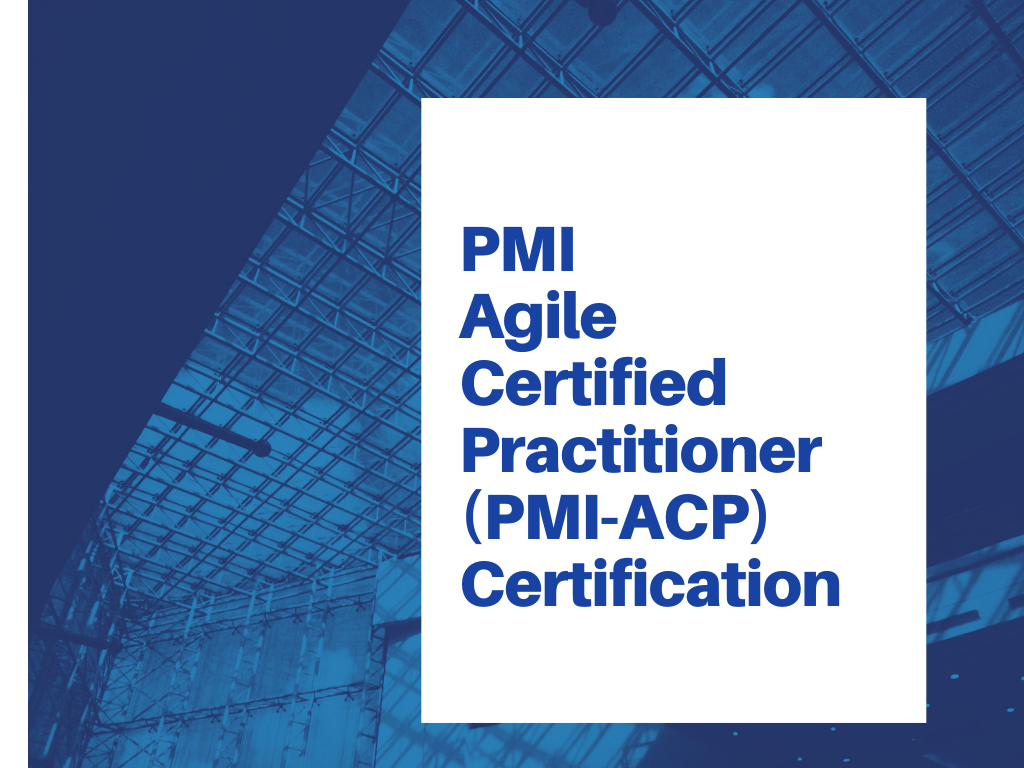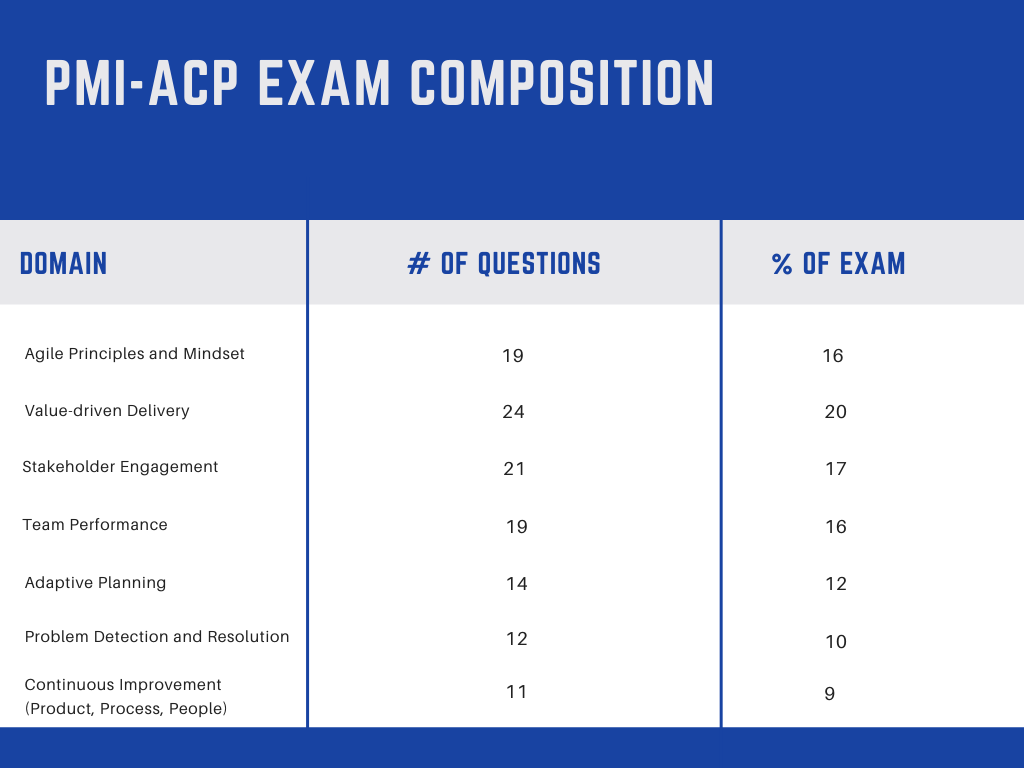What is the PMI-ACP Certification

Exam syllabus
The Agile Certified Practitioner (ACP) exam is administered by the Project Management Institute (PMI). The exam is based on the PMI-ACP Examination Specification, which describes tasks/activities from seven domains and tasks:
- Agile Principles and Mindset (16%)
- Value Driven Delivery (20%)
- Stakeholder Engagement (17%)
- Team Performance (16%)
- Adaptive Planning (12%)
- Problem Detection and Resolution (10%)
- Continuous Improvement (Product, Process, People) (9%)
The test is aimed at validating a candidate’s knowledge and experience of Agile practices, principles, as well as The Agile Toolkit (Tools & Techniques and Knowledge & Skills). If you are a great collaborator, embrace complexity and are interested in continuous and rapid delivery, the PMI-ACP certification may be for you.

The exam consists of 120 multiple choice questions based on the Agile Practice Guide (A creation of the Project Management Institute and Agile Alliance) and the PMI Code of Ethics. The time allowance is 180 minutes.
The exam is a closed-book one with no reference materials allowed. The only reference materials allowed are your brain-dumps (allowed on the materials you are given for rough sketches after the proctor checks you into the exam center and your test has officially started). The Online Proctored Test (OPT) allows virtual whiteboard while Center-based Testing (CBT) allows physical sheets and pencils for note taking.
Twenty (20) of the 120 questions on the exam are seeded “sample” questions. These questions are used to test their level of difficulty and quality to determine if they should be added to the PMI’s questions base. The seeded questions do not count against you as a test taker. These questions are placed randomly throughout the exam. The test taker is only graded on their proficiency in the remaining 100 questions.
The examination is available in 6 languages:
- Arabic
- English
- Brazilian Portuguese
- Japanese
- Korean
- Spanish
Item references
An exam question with its possible answer choices has at least two references to standard books or other sources of agile project management. Most of the questions reference the PMI Agile Practice Guide.
For each of the domains, there are associated numbers of sub-domains and tasks as indicated in the PMI-ACP Examination Content Outline.
- Agile Principles and Mindset (9 tasks)
- Value Driven Delivery (4 sub-domains, 14 tasks)
- Stakeholder Engagement (3 sub-domains, 9 tasks)
- Team Performance (3 sub-domains, 9 tasks)
- Adaptive Planning (3 sub-domains, 10 tasks)
- Problem Detection and Resolution (5 tasks)
- Continuous Improvement (Product, Process, People) (6 tasks)
The Agile Practice Guide emphasizes the importance of an Agile Mindset (Being Agile) as project agility gains more attention from industries outside software development.
Purpose
Non-Profits, government, and other organizations rely on PMI-ACP certified individuals to improve responsiveness to change, speed of delivery and the degree of innovation. PMI-ACP certified project managers achieve this by applying their knowledge and experience of several agile project management methodologies and techniques depending on the project environmental factors as detailed in the Agile Manifesto and the Agile Practice Guide.
The PMI-ACP certification is among the topmost in-demand certifications in 2020 according to Whiz Labs. Agile Certified Professionals earn between $110.000 – $136,000 per year depending on experience according to the Scrum Alliance. The need for Agile Certified Professionals has increased steadily over the years as organizations either attempt to steer away from traditional/waterfall methodology or increase their project management approach options.
Organizations that are very agile and responsive to market dynamics achieve more project completion rates than their less responsive counterparts according to PMI’s 2015 Pulse of the Profession® report
Examination process
Pearson VUE testing centers provide the PMI-ACP exam as a computer-based test either at a test center or remotely. They are administered with the supervision of proctors.
The exam consists of 125 questions. 20 are seeded questions, which are not included in exam grading. The overall score is based on the other 100 questions. Each multiple-choice question has one correct answer and three incorrect answers. There is no penalty for an incorrect answer.
As noted earlier, the examination can now be taken from home or an office location as extra options to sitting for the exams at the testing center.
There will be a live proctor and the requirements include a quiet environment, a reliable internet connection and a computer with a webcam.
Candidates who take the computer-based test receive their results (passed or not passed) on the screen immediately upon completion using PMI’s 4 proficiency levels (Above Target, Target, Below Target, and Needs Improvement) in each of the 7 domains.
Examinations are administered via Online Proctored Test (OPT) or Center-based Testing (CBT). The proctors provide the exam results to the candidate on a score report after the examination.
PMI Audit
Random Audits are PMI’s modus operandi to verify the experience and/or education claims by certification candidates. This is done to maintain the integrity and standing of PMI as a body and the PMI-ACP certification and all other associated certifications.
Item writing
Item writing is used to add new questions to the PMI-ACP Examination database while other questions are taken off using project management guides and texts as guides. Instructors, course developers, book authors, and other individuals who are active in the field of PMI-ACP exam education are not allowed to conduct item writing.
Eligibility Requirements
Candidates must meet the prerequisites in one of the following groups to be eligible for PMI-ACP Certification:
Group A
- Secondary degree (high school diploma, associate degree or the global equivalent)
- 12 months of experience working on general project teams in the last 5 years (An active PMP certification will satisfy this requirement)
- 8 months of experience working on agile project teams in the last 3 years in addition to general project team experience
- 21 contact hours of agile project management education
Group B
- Bachelor’s degree or Postgraduate degree
- 8 months of experience working on agile project teams
- 35 contact hours of project management education
Continuous Credential Requirements (CCRs) require Professional Development Units (PDUs)
Project Management Institute Agile Certified Professionals (PMI-ACPs) require a total of 30 Professional Development Units (PDUs) every 3-year Cycle to maintain their certifications. PDUs are earned by:
- Education
- Giving back to the profession
The minimum number of PDUs that can be earned from education is 18 and the maximum that can be earned from giving back to the profession is 12.
The following activities qualify as PDUs
- Creating educational content on project management topics using articles, videos
- Speaking at project management events
- Practicing as a project manager
- Attending project management training or courses
- Research in the field of project management
The PDUs must satisfy the components of the PMI Talent Triangle (technical, leadership, and strategic and business management expertise).
Other PMI credentials
PMP (Project Management Professional) is one of nine credentials offered by PMI:
- PMI Project Management Ready
- Certified Associate in Project Management (CAPM)
- Project Management Professional (PMP)
- Program Management Professional (PgMP)
- PMI Agile Certified Practitioner (PMI-ACP)
- Disciplined Agile
- PMI Risk Management Professional (PMI-RMP)
- PMI Scheduling Professional (PMI-SP)
- Portfolio Management Professional (PfMP)
- PMI Professional in Business Analysis (PMI-PBA)
